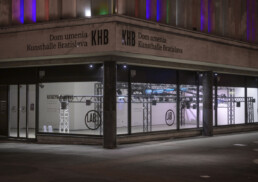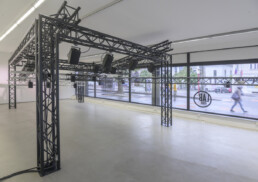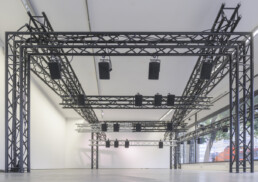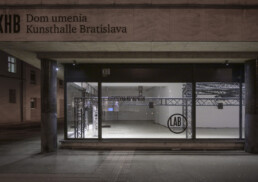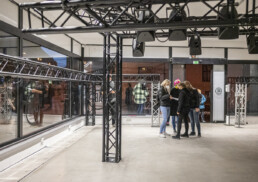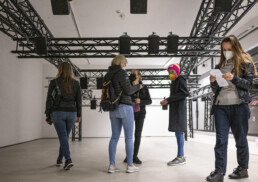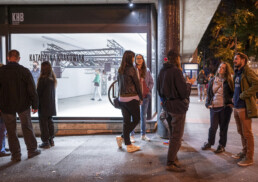It is not night yet
It is not night yet, 2.10-14.11.2021, Kunsthalle Bratislava
kuratorka: Lýdia Pribišová
A mass laughter “erupts” through the walls and facades of Kunsthalle Bratislava on SNP Square. Its source is thousands of recordings of laughter by women, men and anyone else who supports equal rights and freedom. These recordings, to which individuals from different countries have contributed, form one united voice that speaks out against injustice, exclusion and oppression.
In Bratislava, Krakowiak created a monumental sound bridge that connects people, allowing emotions to flow freely. Laughter, as a natural reflex that exists outside of language, accompanies situations where words no longer work. Its atavistic, almost animal-like power and energy mobilizes and unites communities. It is just what we need in times of crisis, when rights are trampled and freedoms are violated. Laughter is the universal human language that brings positive energy and hope in a long period of depression. The sound is invisible, as is the power of laughter. Katarzyna Krakowiak’s installation carries a powerful message of collective strength, mutual support and hope.
For Krakowiak, however, silence is also important. In her work for Kunsthalle Bratislava, it is from silence that laughter emerges, inconspicuously bubbling and gradually increasing in volume. Silence is an effective instrument for tracing the world in thought. It is the voice of thought, redefining and remodeling the reality of sound. The acoustic realm is uniquely woven into the thread of silence.
Krakowiak’s new project, like her previous ones, is full of ambivalence and subversion. There is no simple reading here, and interpretation can take place on different levels. The work evokes both positive and negative emotions. It is disturbing. On the one hand, the project evokes positive emotions, calling for community healing and releasing a stream of joy and merriment through laughter to help us fight the depression that has long afflicted us in the pandemic era. On the other hand, the piece addresses another source of depression: the refusal to respect women’s basic rights. At this level, laughter turns into rebellious mockery.
Thinking about her new project, we start from the Kunsthalle Bratislava’s central location in the city, adjacent to other institutions such as the Polish Institute, the hospital, the market, and the Ministry of Culture of the Slovak Republic. Krakowiak plays a sound game, “sonifying” hidden aerial trajectories, looking for points of relationship; laughter here becomes architecture, a bridge. Traditionally, in fact since prehistoric times, architecture has divided the world acoustically and visually into the external and the internal. Krakowiak’s sound gestures disrupt this binarity and transform building structures into membranes/filters through which spaces can communicate with each other.
